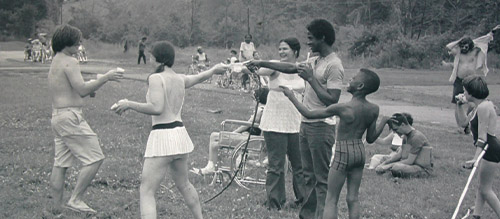Crip Camp (2020) Review
Crip Camp (2020)
Directors: James Lebrecht, Nicole Newnham
Screenwriters: James Lebrecht, Nicole Newnham
Starring: James Lebrecht, Judy Heumann, Ann Cupolo Freeman, Denise Sherer Jacobson, Neil Jacobson, Lionel Je’Woodyard, Joseph O’Conor, Corbett O’Toole, Eunice Fiorito, HolLynn D’Lil, Dennis Billups
In a world that is seemingly more unjust and unequal with each day that goes by, heartfelt and headstrong documentary Crip Camp is a sobering but hopeful reminder of a time almost five decades ago when civil rights for disabled Americans took a giant leap forward. Camp Jened “changed the world” and this is its story.
Camp Jened, not far from Woodstock, summer 1971. This was no run-of-the-mill summer camp but a welcoming community that gave many disabled young people the fun, friendship and freedom they were missing in the outside world for a few short weeks per year. In the decades that followed, Jened helped to inspire and fuel passionate campaigning for a better quality of life for disabled Americans. Tired of being despised, mocked or ignored, a series of protests, civil disruptions and sit-ins led by former Camp Jened attendees and counsellors were squarely aimed at changing US discrimination laws and bringing about equality in all walks of life.
Crip Camp opens with the sickening fact that, only fifty years ago, disabled kids were usually sent to institutions rather than schools – the barriers to education, socialising and life itself for anyone labelled as “handicapped” were insurmountable. The film’s lead narrator and co-writer-director James “Jimmy” Lebrecht, whose home movie footage makes up the early part of his documentary, then looks back on when he first heard about “A summer camp for the handicapped, run by hippies” and begged his parents to be allowed to go at the age of fifteen.
One former camp counsellor remembers that when he started “I knew as many disabled people as I knew sumo wrestlers” and another realises that “the problem did not exist with people with disabilities, the problem existed with people that didn’t have disabilities – it was our problem!”. As you spend time with all these vibrant personalities at Camp Jened, and meet them again when they are interviewed in the present, you grow deep affection for these people and become immediately invested in their long campaign for better lives.
Everyone is shown to be treated equally and with dignity at Jened, and more importantly never patronised by the counsellors, or as one puts it “Back home you weren’t picked for the team but at Jened you had to go up to bat, and if you didn’t hit the ball you were out”.
The fundamental human rights of people like those who attended Camp Jened would not be kept out of sight of the wider American public for long.
A key passage in the documentary is the public reaction to the airing of a TV exposé on Willowbrook State School, an inhumane institution for the disabled where patients were treated like animals: restrained, neglected and often left naked and soiled. This section of the film is tough to watch – the suffering and indignity of vulnerable people is unflinchingly presented to viewers, but it is a key part of the coming civil rights revolution’s build of momentum.
This is a story that needs to be told, and told in the voices of the very campaigners who forced the changes, such as leading disability rights activist Judy Neumann, recounting their struggles but also the stories of unbreakable bonds formed and some of the happiest times of their lives.
In 1972 there was no anti-discrimination law at the US Federal level, and any movement on this law was vetoed by President Richard Nixon as he argued changing infrastructure across the country, such as adding ramps to public buildings and public transport thoroughfares, would cost too much to benefit too small a percentage of the population. Nixon eventually gave into public and political pressure and signed the Rehabilitation Act, but did little to enforce it. Various institutions from universities to hospitals objected to the added expense they were expected to commit to, even demanding that the administration of the next president Jimmy Carter roll-back or fully rescind the new discrimination regulations, which led to mass peaceful protests and sit-ins at public buildings by handicapped campaigners. The footage and recounts of these events from journalists, campaigners and those involved becomes the documentary’s most powerful passage.
Former campers from Jened took leadership roles within the “504 Sit-in” of Federal buildings across the USA for 25 days in 1977, organising everyone, looking out for each other and making sure their sit-ins were resourced for as long as possible. Deaf sign-language speakers communicated with the outside world when the FBI cut off the phone lines to the occupiers and incredibly the Black Panther Party ran supplies to the protestors.
There are many serious and worthwhile points to be made, but it’s the honest and grounded humanity that really makes the film. Married couple Denise and Neil Jacobson, who both have cerebral palsy, are immensely proud of their still healthy love lives and cheekily recount their first sexual experiences at camp, including one time when a whole group had to be quarantined due to an aggressive outbreak of crabs among horny teenagers.
There is so much joy, laughter and inspiration to be found in this story. There is a scene towards the end of the film where former campers and counsellors meet at the now derelict former site of Camp Jened and reminisce and remember those who are no longer with them. It won’t leave a dry eye in the house.
Crip Camp is an essential story of liberty and spirit against impossible odds, and it reinforces the idea that the world has come a long way, even if progress can still be made.
24/24


